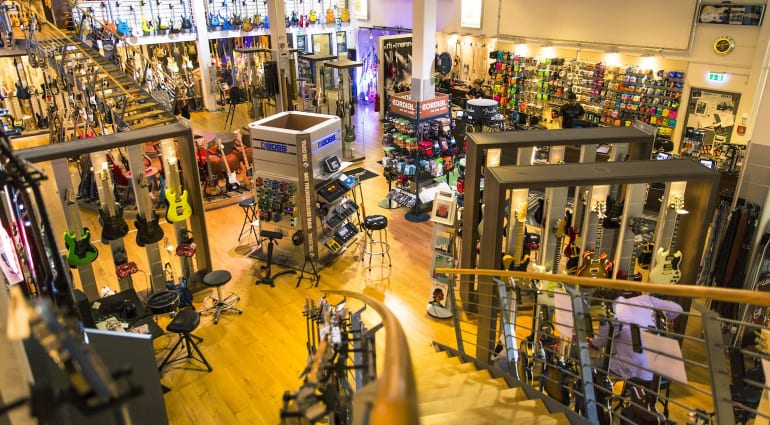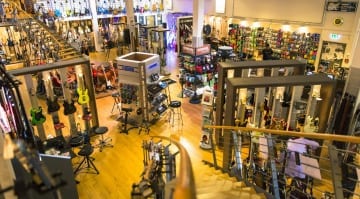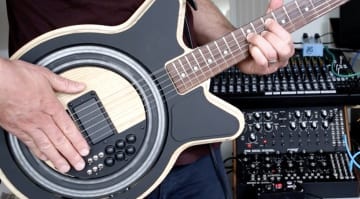Has COVID-19 saved the electric guitar?
The numbers say yes!
At the start of the year, as the coronavirus spread across the globe, the guitar industry looked like it would be hit as bad as any. But according to a recent New York Times article, the guitar didn’t just survive the pandemic, but is actually thriving.
Lockdown Uncertainty
As lockdown measures got enforced to battle the coronavirus, many industries, including guitar manufacturers, were uncertain what the future would hold for them and their employees. By all accounts, predictions at the beginning of the lockdown seemed dire. Chris Martin, Chief Executive of C. F. Martin & Co., the sixth-generation Martin to run the 187 year old company said, “I figured that this is one of those business-falls-off a-cliff situations… We’ll pick up the pieces and put the company back together whenever.” After revenues initially fell 40% below normal in March, the company suddenly saw an increase in sales.
“It’s unbelievable the demand there is right now for acoustic guitars. I’ve been through guitar booms before, but this one caught me completely by surprise.” – Chris Martin
Andy Mooney, chief executive of Fender Musical Instruments Corporation adds, “I never would have thought we would be where we are today if you asked me back in March… We’ve broken so many records. It will be the biggest year of sales volume in Fender history, record days of double-digit growth, e-commerce sales and beginner gear sales.”
Gibson has also seen an increase in sales. According to CEO James “JC” Curleigh, “When we had no production, we had no sales, let’s face it.” But later on in the summer, “we literally couldn’t deliver enough… Everything we were making, we could sell.” Other manufacturers are reporting similar successes.
Sales start soaring
Retailers are also sharing similar results of guitar sales increasing dramatically over the past few months.
In spite of having to close down 293 of its 296 showrooms in early March/April, Guitar Center has reported triple-digit sales growth for most top brands. US Online retailer Sweetwater has also seen a surge in guitar sales. “I’ve been in the instrument retail business for 25-plus years and I’ve never seen anything like it,” says Brendan Murphy, a senior salesman at Sweetwater, of sales in July. “It feels like every day is black Friday.”
Hans Thomann, managing Director of German online retailer Thomann comments, “We have seen very stable sales of both electric and acoustic guitars over the last few months.” But he warns that, “making any predictions at this volatile time is very difficult. And while we have seen strong sales for some instruments, in other areas our customers are facing a lot of uncertainty. We hope for a more positive outlook for everyone looking forward.”
What changed?
How did sales suddenly go from manufacturers desperately searching for new ways of propping up sales to record figures? In truth, guitars aren’t the only items people seem to be spending on during lockdown. Bicycles, yoga mats, board games, among a host of other items have seen an increase in sales as people stay indoors. But the guitar isn’t really an ‘essential’ item, or something someone would consider purchasing in times of economic uncertainty.
Gibson’s James Curleigh puts it down to “Maslow’s hierarchy of needs”. The theory proposes that people must first satisfy fundamental needs before they can move on to the higher goal of self-actualisation. “That’s what the world went through,” Mr. Curleigh said. “First we were figuring out the basic essentials — where to buy toilet paper, making sure you were isolated in quarantine. Then the psychological reset hit. People said, ‘Well, I can still self-actualize, I can still self-fulfill.’”
All of a sudden time became your friend
Fender’s Fender Play guitar-instruction app has also seen a dramatic increase in its user base, from 150,000 to 930,000 between late March and late June. 20 percent of these new users were under 24, and 70 percent were under 45. 45 percent of the new user base was female, an increase from the 30 percent before lockdown. The rise in numbers could be attributed to the fact that people suddenly had more spare time. JC Curleigh adds, “In a world of digital acceleration, time is always your enemy. All of a sudden time became your friend.”
And all this isn’t even taking into account the secondhand market on platforms like eBay and Reverb. According to Music Trades publisher Paul Majeski, “The public’s interest in fretted instruments has never been greater”.
What happens next?
Will this trend continue? Or will these guitars that were bought under lockdown eventually get retired to attics or under beds, as public places slowly start opening, and people start filling up their time with other activities?
Let us know your thoughts in the comments section below!









